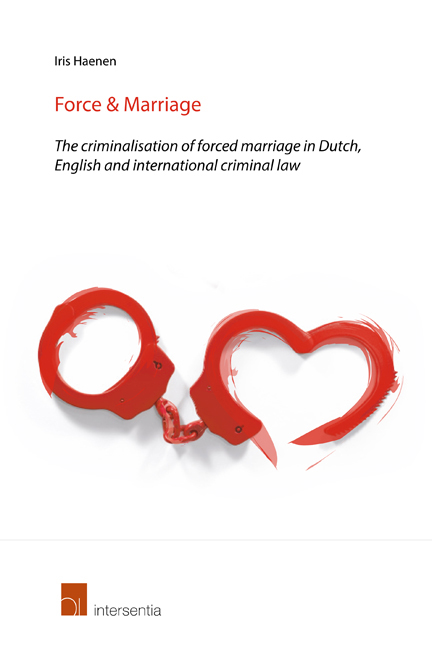 Force & Marriage
Force & Marriage Book contents
- Frontmatter
- Acknowledgements
- Contents
- Abbreviations
- General introduction
- PART I FORCE AND MARRIAGE: Description and definition of forced marriage
- PART II A TALE OF TWO THEORIES: Criminalisation on the level of national law and international law
- Chapter 4 National criminalisation
- Chapter 5 International criminalisation
- Chapter 6 Comparing national and international criminalisation
- PART III THE LAW AND FORCED MARRIAGE: Legal frameworks concerning forced marriage in Dutch, English and international criminal law
- PART IV ANALYSIS AND CONCLUSIONS
- Summary
- Bibliography
- Table of cases
- Curriculum vitae
- Index
Chapter 4 - National criminalisation
from PART II - A TALE OF TWO THEORIES: Criminalisation on the level of national law and international law
Published online by Cambridge University Press: 22 November 2017
- Frontmatter
- Acknowledgements
- Contents
- Abbreviations
- General introduction
- PART I FORCE AND MARRIAGE: Description and definition of forced marriage
- PART II A TALE OF TWO THEORIES: Criminalisation on the level of national law and international law
- Chapter 4 National criminalisation
- Chapter 5 International criminalisation
- Chapter 6 Comparing national and international criminalisation
- PART III THE LAW AND FORCED MARRIAGE: Legal frameworks concerning forced marriage in Dutch, English and international criminal law
- PART IV ANALYSIS AND CONCLUSIONS
- Summary
- Bibliography
- Table of cases
- Curriculum vitae
- Index
Summary
INTRODUCTION
The central question of this research revolves around criminalisation of forced marriage: should this practice be criminalised, and, if so, how? Should it be prohibited as a distinct, separate offence, or under the heading of (generic) existing crimes? Decisions regarding criminalisation are, for a large part, based on policy choices and political considerations, and are therefore dependent on the political hue of the incumbent government. For example, in the Netherlands, (criminal) law was traditionally used more or less exclusively as an instrument of ‘codification’, that is to say as a means to record existing moral views. However, as a result of the development of Dutch society from a welfare state into a security state, coupled with the growing influence of populism, (criminal) law is increasingly used as an instrument of ‘modification’, i.e. as a means to change views and behaviour in society. This has led to a trend of increased willingness to penalise and thus to a proliferation of criminal offences. The same can be said for England, indeed, it has been stated that Anglo-American jurisdictions in general create offences in a casual and routine manner.
Yet irrespective of the highly political nature of criminalisation, certain guidelines can be distilled from legal doctrine. The issue of criminalisation has exercised and still exercises many minds and the question of what justifies criminal prohibition has inspired lawyers and philosophers to fill reams upon reams of paper, exploring the conditions that must be satisfied before the state may proscribe certain behaviour, thereby subjecting the culpable offender to criminal liability and (subsequently) punishment. Throughout the years, different theories of criminalisation have been articulated. There are clear similarities between these theories, which, for a large part, build on each other. As De Hullu – one of the leading Dutch criminal law scholars – noted, what most theories have in common is that they require that the necessity and added value of criminalisation must be demonstrated, either from a practical or from an ideological or legal theoretical point of view.
- Type
- Chapter
- Information
- Force & MarriageThe criminalisation of forced marriage in Dutch, English and international criminal law, pp. 119 - 136Publisher: IntersentiaPrint publication year: 2014


